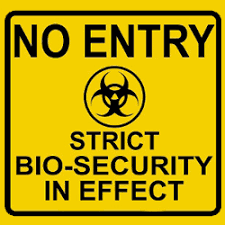In the past few weeks, the media has been agog about the news of novel and existing disease outbreaks in humans and animals both globally, nationally and locally. Notable among these include the globally-spreading Coronavirus, the endemic Lassa Fever in Nigeria and new outbreaks of Parvovirus in dogs in our communities. With these occurrences, there is an urgent need for livestock farmers, animal breeders and pet lovers to pay more attention to biosecurity which will help keep both animals and humans safe and minimize death tolls.
In simple terms, Biosecurity is a preventive measure or activity that is undertaken to avoid contact between your animals and microbes that can cause diseases. This is basically achieved by carrying out rational day-to-day activities in the management of your animals that will prevent and reduce the risk of transmission of infectious diseases to your animals. They are generally based on simple activities that cost little or nothing to carry out. If biosecurity measures are not followed and the diseases eventually appear, livestock farmers and animal breeders would spend more time, money and efforts on treatment.
Biosecurity measures can take care of all diseases and can be applied on all kinds of pet and livestock animals including canine, feline, poultry, fisheries, cattle, sheep and goat, etc and they include the following simple rules;
- Keep animals in good condition
Keep your animals in good condition by consistently by providing them with clean water, adequate and quality food, comfortable housing, timely vaccination and timely deworming. Animals kept in bad conditions are more likely to succumb to diseases and are generally less productive. Examples of reduced productivity include reduced egg production in poultry farms, reduced meat from cattle production, and reduced activity or playfulness of dogs. For livestock farmers, reduced productivity will invariably lead to a decrease in income.
- Keep animals in a protected, safe and noiseless environment
It is important that farmers keep their animals in a protected and safe environment. It is safer and better for animal farms to be away from noise and places that are densely populated (especially those in large-scale livestock farming). For small-scale farmers including those with backyard farms, ensure you provide good housing and keep it isolated from the main house.
- Practice Culling
When doing your rounds and check-ups on an animal farm/brood, any animal that is observed to be sick should immediately be removed and separated from the (apparently) healthy animals. This is called Culling the animal. They should undergo a medical check-up and be observed for changes – good or bad. Also when you do your observation rounds, it is safer for you to move from healthy animals to sick animals instead of the other way round. This would help you to control disease transmission.
- Control all farm entries and movement

Image source – Valco
Make sure you control all entries and movement to your farm especially with regards to human movement, other external animals (alive or dead), tools, items, vehicles, equipment, feed, manure, etc. Ensure that the place where animals are situated is restricted and only authorized personnel can enter. Also, from the main entrance, ensure you have places for changing of work clothes, disinfecting and washing of hands, legs, and equipment. Also, other things like animal feed, equipment, live or dead animals, vehicles and manure must be stored or placed in restricted places away from the main farm.
- Quarantine
New animals must be kept in a separate place for about 2 weeks before introducing and joining them with the remaining animals. This is called quarantine. Note that not all animals that look healthy are actually healthy. (That is why in medical terms, healthy animals are called “apparently healthy”). So the quarantine gives you the opportunity to monitor the animal for any sign of disease or ill-health.
Later, in this Biosecurity series, we would discuss what you should do when there is an animal disease outbreak in your neighborhood.
By Dr. Kikiope Oluwarore-Isedowo





